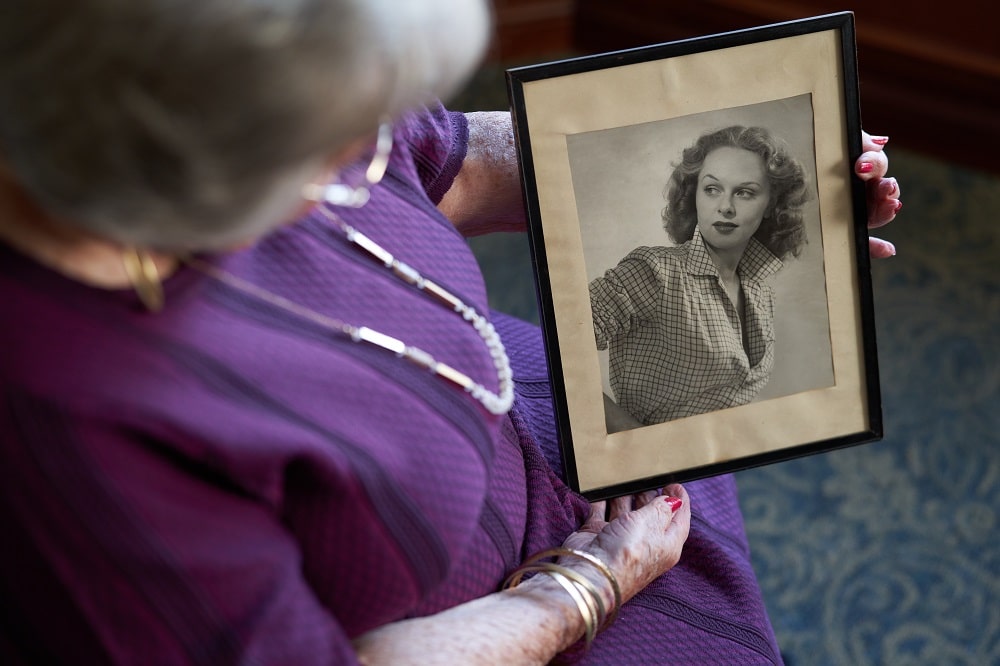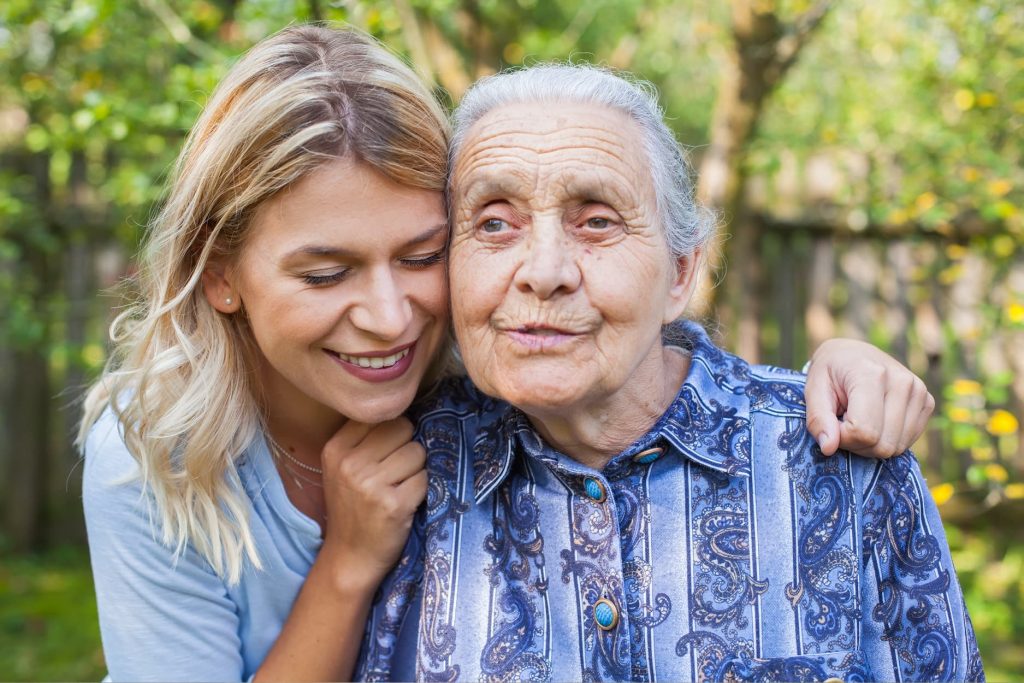
Dementia does not affect every person in the same way. It presents itself differently in each individual and progresses at different rates. Some people will stay in a state of mild decline for an extended period, while others may develop multiple symptoms quickly. Understanding the seven stages of dementia can make these transitions a little easier for your loved one and you as their caregiver.
Let’s start from the beginning. The term dementia refers to the loss of cognitive function—whether that is one’s ability to recall information, think clearly, or reason. Often, dementia and memory loss will impair your loved one’s ability to function comfortably and safely in their daily life. Dementia can interfere with everyday activities. Their symptoms can include memory loss, impaired language skills, inability to problem-solve, inability to self-manage, and loss of focus. Your family may notice subtle changes in your loved one’s ability to control their emotions. Or they may feel like a stranger to you as their personality changes. You may notice more notable changes such as withdrawing from social events, forgetting to take their medications, or they stop paying their bills.
Memory loss is not a normal part of the aging process. It’s not an inevitable part of old age. One’s memory and ability to recall may slow down with age—that’s normal—but their intellect remains the same. These lapses of harmless forgetfulness are commonly referred to as “senior moments” but do not interfere with their daily activities or threaten their safety. Dementia is different from the usual bouts of forgetfulness.
No single test can determine if your loved one has dementia. A physician will examine several factors to come up with a diagnosis, including a full medical history, physical exam, laboratory tests, and recognizing a pattern of loss of function and skills. With a high-level of certainty, doctors can diagnose a person with dementia, but it’s more challenging to define the exact type of dementia. Biomarkers can help make an accurate diagnosis of Alzheimer’s disease, which is included under the umbrella of dementia.
Several tests can be used to help measure your loved one’s cognitive skills such as memory, learning, judgment, language, and attention span. These tests are useful indicators if they need further evaluation. If your loved one fails a test, they should be referred to a specialist.
A doctor performs a neurological examination to evaluate physical movement, balance, reflexes, and eye movement. This type of exam can help identify conditions, such as a stroke, brain tumor, Parkinson’s disease, or other illnesses that can affect a diagnosis of dementia and if they are treatable.
Brain imaging tests can help rule out other problems that may cause memory loss or impairment.
A blood test can detect any physical problems that might affect brain function or cause mental impairment, such as a vitamin deficiency, infection, liver or kidney function, electrolyte levels, low blood sugar, signs of inflammation, or an underactive thyroid.
A mental health professional can evaluate a patient’s sense of well-being and look for signs of depression, mood swings, or any other mental health issues that might cause memory loss symptoms.

Everyone starts at stage 1 with no symptoms of cognitive impairment. Mental function is normal.
Stage 2 can vary between typical age-related memory problems that most seniors face, such as forgetting specific dates or slower recall of a name or word. Or this stage could include some of the beginning signs of dementia that are often not obvious to doctors and loved ones. Some of the side effects that correspond with stage 2 include:
Stage 3 is where dementia or Alzheimer’s disease symptoms can become more noticeable to friends and family. This stage will not have a major impact on your loved one’s everyday life, but signs can include:
Stage 4 is commonly defined as early dementia or Alzheimer’s disease. Symptoms of cognitive decline are apparent, and your loved one should be consulting with a health care professional. Signs at this stage include:
Stage 5 is when your loved one is likely to need help with routine tasks, like dressing or bathing. They may require a home caregiver or to move to a memory care community. Other symptoms include:
Also known as middle dementia or moderately severe Alzheimer’s disease, stage 6 will find your loved one requiring help for Activities of Daily Living (ADLs), such as bathing, toileting, or eating. This stage may include:
Stage 7 is severe Alzheimer’s disease or late-stage dementia. Your loved one cannot care for themselves, may experience severe motor and communication impairment, and may lose the ability to speak or walk.
The progression of dementia in your loved one is as individual as the person who has it. There is no specific roadmap or timeline to transition through the seven stages. But all types of dementia are progressive and damaging over time. Several factors can affect the rate of progression; these include:

Although most of your loved one’s immediate medical needs can be managed on their own in the early stages, you may need to assist with tasks associated with memory or problem-solving. You may need to remind them of their doctor’s appointments and to set up the next appointment, along with taking their medications on time and getting refills as needed. You may need to assist them in managing their finances and keeping up with social and work obligations. At times, they may also need help remembering places, people, words, and names. In the early stages, you will want to encourage them to:
According to the Alzheimer’s Association, this can be the most prolonged period you will face as a caregiver. The symptoms associated with the middle stage can continue for most of your loved one’s later years. During this time, you will need to learn to develop patience, flexibility, and understanding as their day-to-day functions become more difficult to achieve. Your loved one might need assistance with ADLs, act out in strange ways, or grow frustrated and angry with you, which can be stressful. Be sure to take care of yourself and reach out to family, friends, and other support services to make this transition smoother.
According to the Alzheimer’s Association, the later stages will be the most difficult, as your loved one is now very frail and relies on you for most of their daily care. At this late stage, encouraging your loved one to eat and sleep will grow increasingly difficult. During this time, they may lose the ability to walk steadily, so an occupational therapist may help them stay mobile without falling. Gather a team of experts to help you, like a speech therapist to help with communication and a nutritionist to recommend the best food and alternative food options, like blended meals, smoothies, and finger foods, that boost the immunity and are packed with nutrition. Incontinence, severe memory loss and disorientation, immune system problems, repetitive movements, and strange or unusual behavior must all be managed during this stage as well.
Watching a loved one live with dementia is never easy. With the proper tools, you can help them navigate their symptoms to live an enriching life. Staying on top of the latest research with Google alerts and attending seminars from expert speakers and medical professionals will keep you up-to-date on new treatments and care techniques. Most importantly, find a supportive community. There are many support groups for caregivers where you can share your successes, frustrations, fears, and joys with other caregivers. Remember, you are not alone!
Aegis Living’s innovative and dedicated memory care program, Life’s NeighborhoodTM, is designed to ease the symptoms of cognitive decline and celebrate each resident’s life. Every memory care community is secured for the safety of the residents and your peace of mind. If you are interested in learning more about memory care at Aegis Living, set up a tour with your nearest community today.